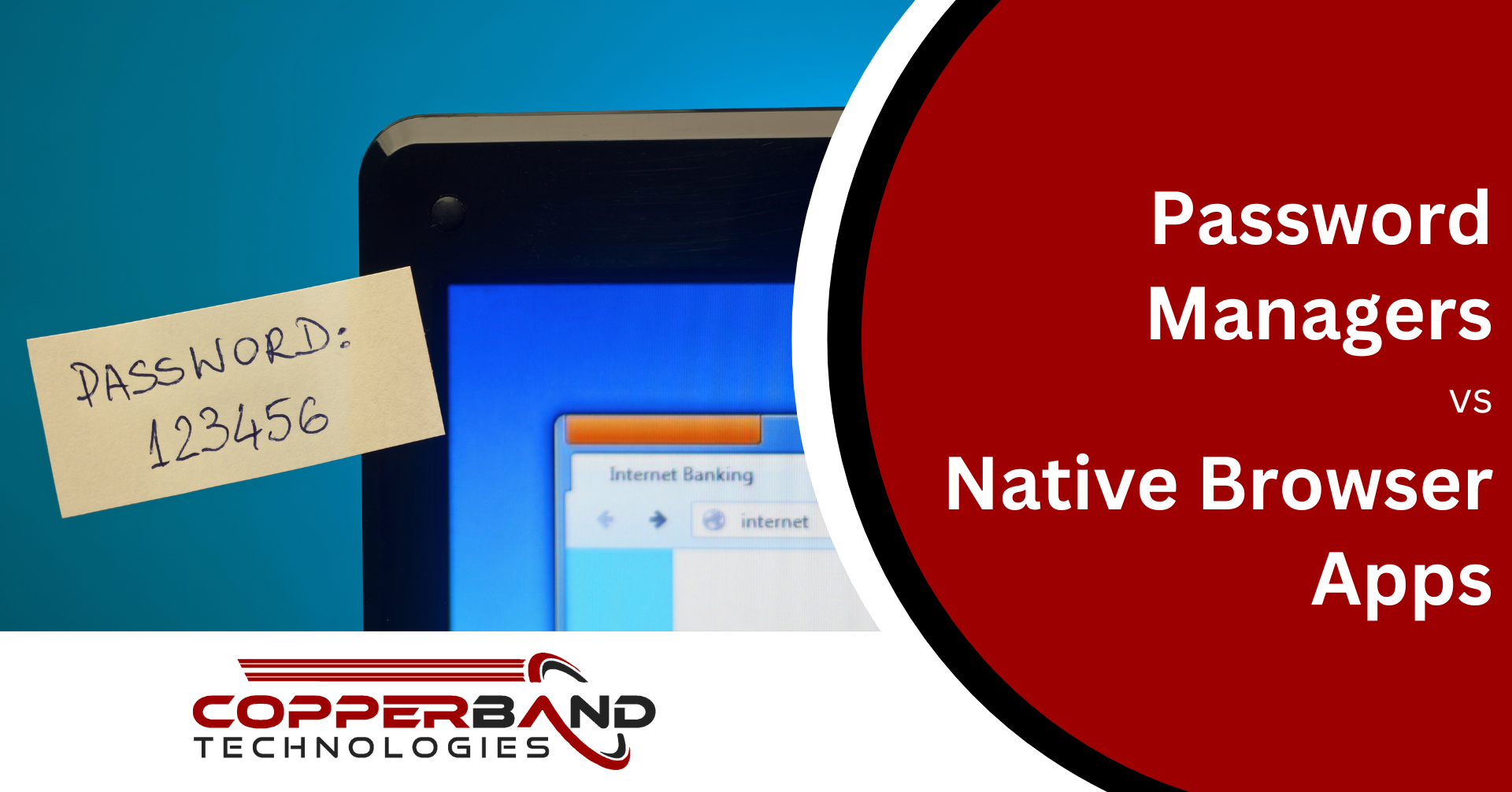Password Managers vs Native Browser Apps

As our digital footprints grow, managing a myriad of passwords has become a challenge for most users. While some resort to using native browser apps like those in Chrome, Edge, Safari, and Firefox to store passwords, others opt for professional password managers. In this post, we’ll dissect the differences between the two and highlight why businesses in particular need more robust solutions.
The Key Differences
Password management is more than just about storing passwords. The core design, functionality, and purpose of the storage mechanism play a crucial role.
1. Purpose and Primary Functionality
- Password Managers: They are engineered with one primary goal in mind – safeguarding user credentials. Every feature, from the user interface to the backend processes, revolves around enhancing security, promoting easy management, and ensuring user convenience without compromising safety.
- Native Browser Storage: Web browsers are designed for browsing. The password storage functionality, while useful, is a subset of a much larger set of features aimed at enhancing the web browsing experience. As such, the primary focus isn’t entirely on password security but on delivering an integrated user experience.
2. Storage Mechanism
- Password Managers: They store passwords in an encrypted vault, often in the cloud but sometimes locally, depending on the service. The vault is accessible only through a master password, ensuring that even if a device is compromised, the passwords remain protected.
- Native Browser Storage: Browsers typically save passwords on the device itself. Although they employ encryption, the level of protection varies. On shared computers, there’s potential exposure if someone gains access to your browsing profile.
3. Recovery Options
- Password Managers: Most dedicated managers offer recovery options that are both secure and user-friendly. Some employ security questions, recovery emails, or even biometric verifications.
- Native Browser Apps: Recovery is usually tied to the user’s browser or OS account. If someone loses access to their Google account, for instance, they might be locked out of all saved passwords on Chrome.
A Dive into Security
When it comes to managing something as sensitive as passwords, the strength and sophistication of security protocols are incredibly important. Both password managers and native browser apps have measures in place, but how do they stack up?
1. Encryption Standards
- Password Managers: Dedicated tools usually employ top-tier encryption algorithms, such as AES-256 bit, which is considered the gold standard in the realm of cybersecurity. This ensures that even if hackers gain access to the vault, decrypting the data is nearly impossible without the master key.
- Native Browser Apps: While browsers do use encryption to secure saved passwords, the standards can vary. Not all browsers might employ the latest or most robust encryption methods. Moreover, these encryptions might be vulnerable to browser-specific hacks or flaws.
2. Multi-factor Authentication (MFA)
- Password Managers: Recognizing the importance of layered security, many professional password managers now offer or even mandate MFA. This could be in the form of biometric scans, OTPs, or security keys. MFA ensures that even if the master password is compromised, there’s an added layer of defense.
- Native Browser Apps: While some browsers are beginning to incorporate MFA, it’s not universally adopted or always as stringent as dedicated managers. The MFA in browsers is often tied to the main account, like a Google account in Chrome’s case.
3. Phishing Protection
- Password Managers: Advanced managers have features that ensure credentials are auto-filled only on genuine websites. This helps in thwarting phishing attacks, as the manager won’t fill in the details on a fake site, alerting users about potential threats.
- Native Browser Apps: Browsers rely on their in-built phishing detectors which flag suspicious sites. However, if a user ignores the warning or if a new phishing site isn’t detected in time, the browser might still auto-fill saved credentials.
Features Beyond Storage
While the primary function of password managers is to securely store and retrieve passwords,
1. Password Generation
- Password Managers: A standout feature of many dedicated solutions is the ability to generate strong, complex, and unique passwords on demand. Users don’t need to wrack their brains for a secure combination—these tools churn out high-strength passwords that can significantly reduce the risk of brute-force attacks.
- Native Browser Apps: While some modern browsers offer password suggestions, they might not always meet the highest security standards or offer customization in terms of password length or complexity, although they are getting better.
2. Secure Sharing
- Password Managers: Need to share a password with a colleague or family member? Dedicated managers typically allow secure sharing of credentials without revealing the password itself. Some even allow setting permissions or time limits on shared credentials, ensuring they’re used responsibly.
- Native Browser Apps: Direct sharing features are mostly absent. Users would need to manually share passwords, potentially risking exposure or unauthorized access.
3. Digital Wallets
- Password Managers: Expanding their utility, some password managers offer digital wallet functionalities. Users can securely store payment details, personal IDs, software licenses, and more. This creates a consolidated and secure digital vault for all sensitive information.
- Native Browser Apps: While browsers can store payment details for autofill, they don’t offer comprehensive digital wallet functionalities, leaving users to juggle multiple storage solutions.
User Convenience vs. Comprehensive Security
While native browser solutions offer undeniable convenience, businesses and individuals seeking comprehensive online safety must weigh the potential risks. Purpose-built password managers come tailored with advanced features and robust encryption mechanisms.
In the era where cyber threats loom large, where does your allegiance lie? With convenience or comprehensive protection? If you need help deciding which password manager would be best for you and your business, contact Copperband Technologies today!






